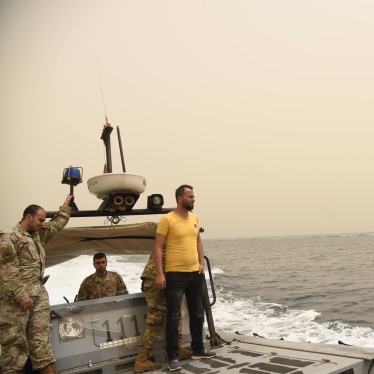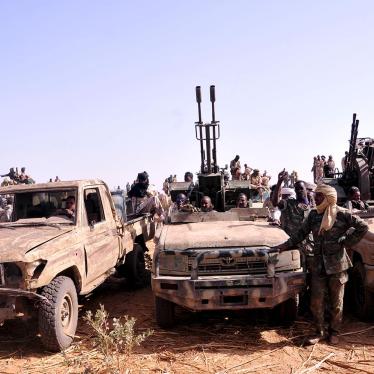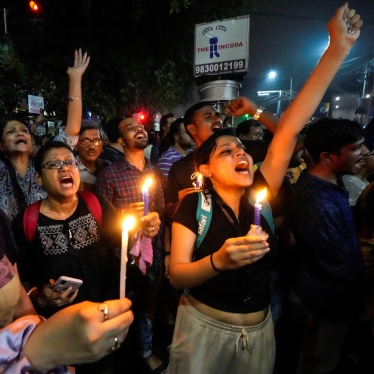In simultaneous predawn raids, Egyptian police on Thursday arrested 17 senior members of the Muslim Brotherhood and rounded up at least 140 students on suspicion of being linked to this banned nonviolent organization following a protest at Cairo’s al-Azhar University, Human Rights Watch said today.
The Egyptian authorities have arrested at least 1,000 members of the Muslim Brotherhood in a crackdown that began in March. Though most of these detainees are now released, representatives of the Muslim Brotherhood told Human Rights Watch they expect further detentions in the days to come. Members detained on Thursday include Khairat al-Shatir, the deputy supreme guide and chief strategist of the organization.
Human Rights Watch called on the Egyptian government to immediately release, or charge, all members of the Muslim Brotherhood imprisoned in this months-long campaign, as well as students arrested for their suspected links to the group.
“Once again, the government is detaining members of a peaceful group whose only crime is pressing for reform,” said Sarah Leah Whitson, Human Rights Watch’s Middle East and North Africa director. “Now the Egyptian authorities are targeting students who are calling for reforms.”
The arrests follow a demonstration by the Free Student Union, a group comprised mostly of students affiliated with the Brotherhood formed in November 2005 to protest alleged government interference in student union elections. On December 10, the students held a sit-in at an apartment building where they have been living since al-Azhar administrators expelled them from dormitories for their political activities. Roughly 35 of them, who wore balaclavas with “samidun” (“the steadfast”) written across them, gave a brief martial arts demonstration and performed military-style exercises. On December 14, police surrounded the dormitory and arrested at least 140 students there, although it is not clear if all participated in the demonstration. Police have not released the names of the detained students.
Photos from the demonstration raised alarm in the press that the Muslim Brotherhood was forming a militia, and police said they were opening an investigation to determine whether this was true. Senior members of the group quickly distanced themselves from the students’ actions, stressing that their organization is peaceful, does not maintain a militia, and that Brotherhood members who participated might face disciplinary action. Mahmud `Izzat, secretary general of the banned organization, told Human Rights Watch that some of the men detained on Thursday morning had personally chastised the students for their actions.
“We apologize for this skit,” the Free Student Union said in a statement released Wednesday. “This is not our way. It reflected poorly on our school and ourselves by making us look like a militia. This image is absolutely untrue. We are students. We did this skit because we felt that no one was listening … to our requests for justice in the university…. The university administration, in cooperation with the security apparatus, has denied us our rights to participate in student union elections.”
“These arrests are merely a part of the government’s continuing campaign against the Muslim Brotherhood,” said Whitson. “If there is evidence that anyone detained has committed an offence beyond belonging to the Brotherhood, the government should bring charges before an independent court and produce the evidence. If not, the authorities must release the detainees immediately.”
The most recent arrests took place within a months-long government crackdown against the Muslim Brotherhood. Most recently, according to the Muslim Brotherhood’s Web site, State Security officers in late November detained 21 members of the organization in the Munufiyya governorate, northwest of Cairo. One student caught in this crackdown told Human Rights Watch that police had tortured him with electrical currents, kept him blindfolded while he was in custody, and tried to force him to incriminate himself. He spoke on condition of anonymity, saying that he feared for his family.
Article 86(bis) of Egypt’s Penal Code criminalizes membership in an organization that “impairs the national unity or social peace.” Such broad definitions invite abuse. As a party to the International Covenant on Civil and Political Rights, Egypt has undertaken to uphold the right to freedom of association. Article 22 of the covenant specifies that the only permissible exceptions to this right are those “which are necessary in a democratic society in the interests of national security or public safety, public order, the protection of public health or morals or the protection of the rights of others.” These exceptions are narrowly framed, and the burden of demonstrating their needs in specific cases rests with the state. The state cannot justify the banning of an organization unless it can show that this extreme measure is necessary to achieve a specific and legitimate purpose within one of the enumerated exceptions.
The Egyptian government has never convincingly justified its continued categorization of the Muslim Brotherhood, which has renounced violence since the 1970s, as an illegal organization. Human Rights Watch called on the categorization to be revoked, and for the authorities to discontinue using its illegality as the pretext for arresting its members.
List of prominent Muslim Brotherhood members arrested on December 14:
1. Khairat al-Shatir, second deputy to the supreme guide of the Muslim Brotherhood
2. Mahmud Abu Zaid, professor of surgery at al-Qasr al-`Aini Medical Faculty, Cairo University
3. Muhammad Baligh, professor at the Conjunctivitis Institute in Giza
4. Amin `Abd al-Ghani, engineer
5. Ahmad `Izz al-Din, journalist, press secretary to the supreme guide
6. Mustafa Salim, accountant
7. Mamduh al-Husaini, engineer
8. Yasir `Abdu, secretary general for the Giza Merchants Syndicate
9. `Isam `Abd al-Muhsin, professor of biochemistry at al-Azhar Medical College and head of the Giza Medical Syndicate
10. Farid Jalabat, professor in the Shari`a and Law College at al-Azhar University
11. Sadiq al-Sharqawi, businessman
12. Mahmud Mursi, engineer
13. Fathi Baghdadi, director of al-Masa`i schools
14. Sayyid Ma`ruf, manager at `Umar Affandi Co.
15. Salah al-Dusuqi, assistant professor of anatomy at al-Azhar Medical College
16. Jamal Sha`ban, accountant
17. Sahib Shawkat al-Malt, secretary general of the Free Students Union at al-Azhar University






